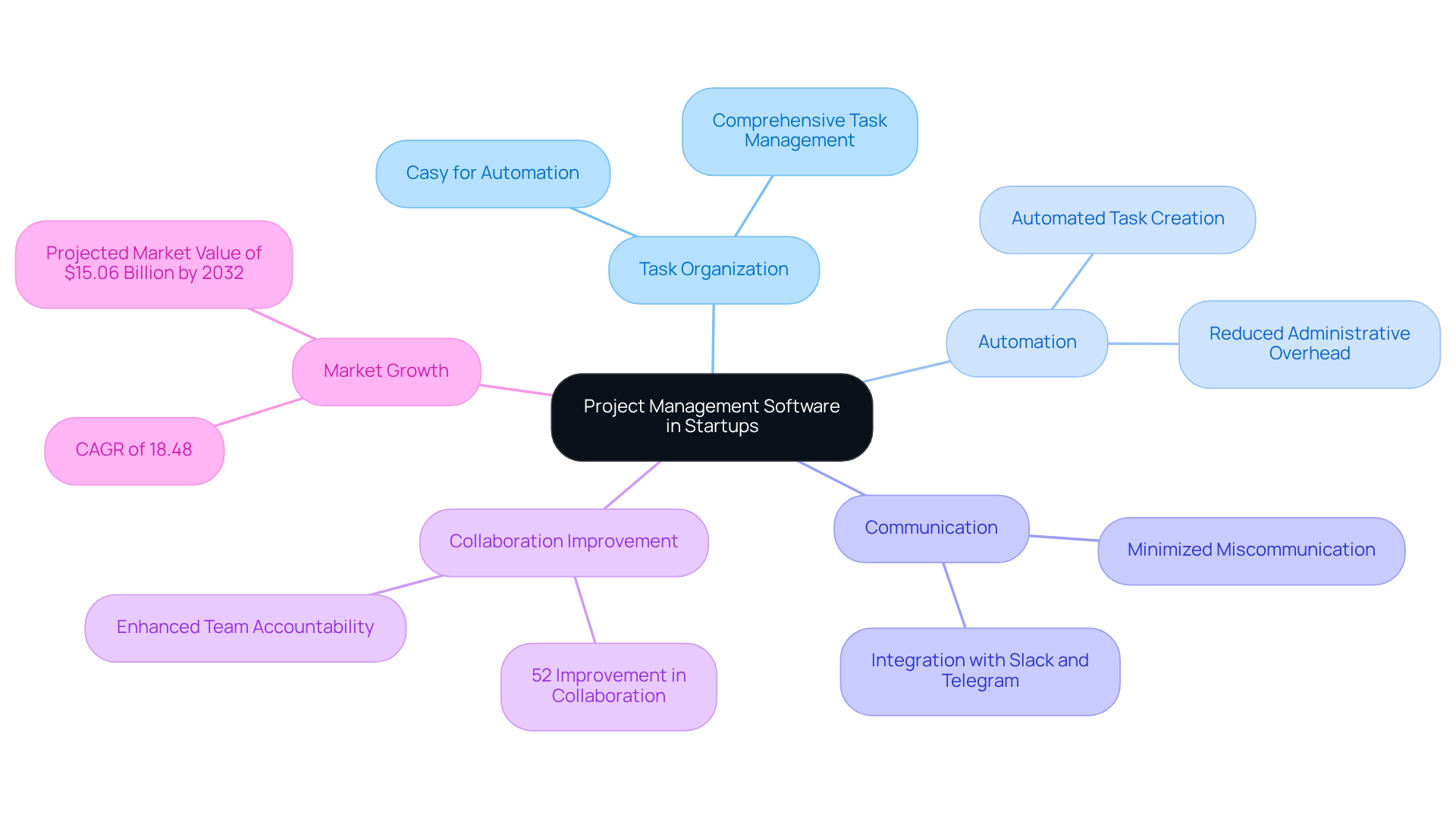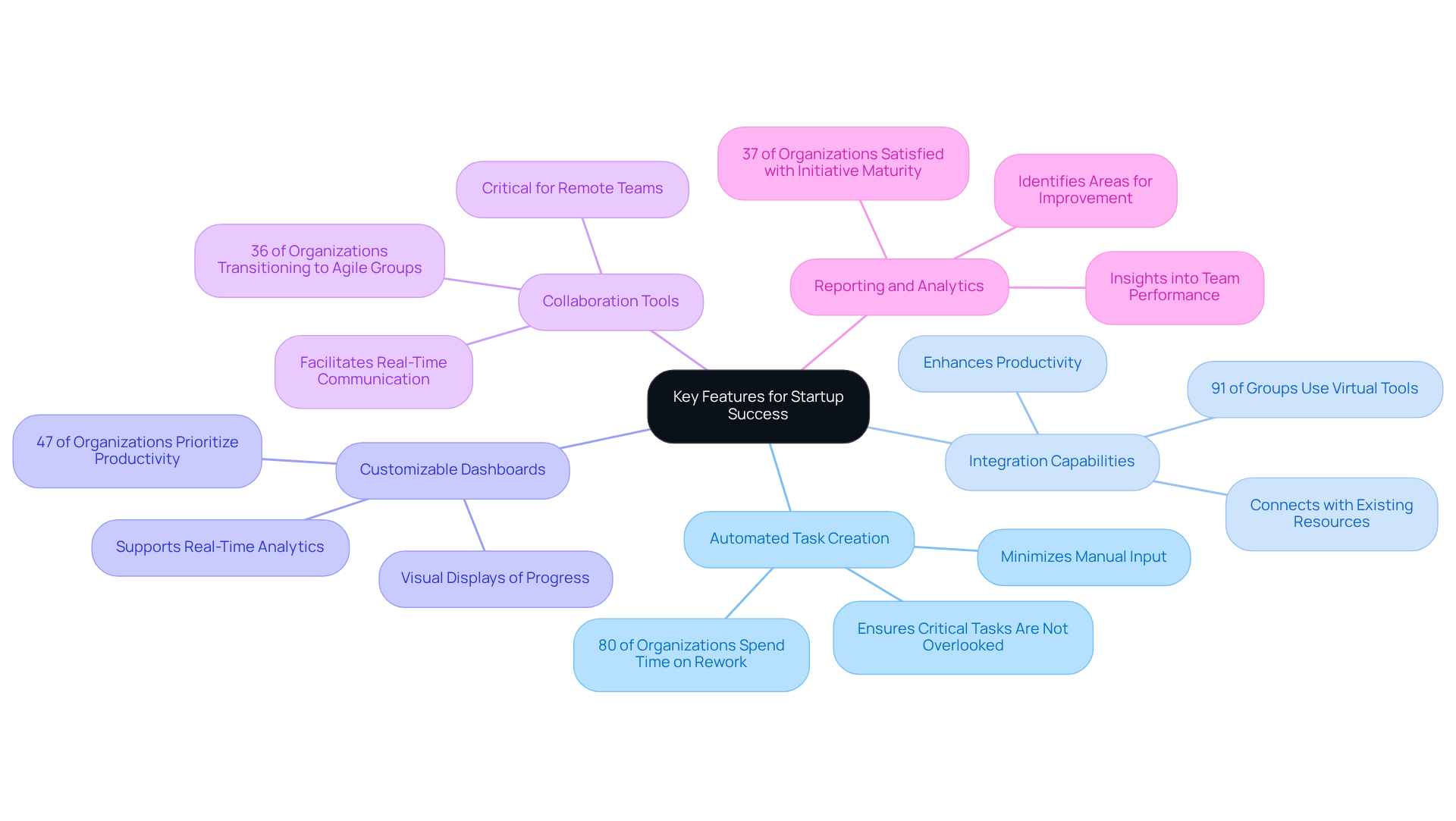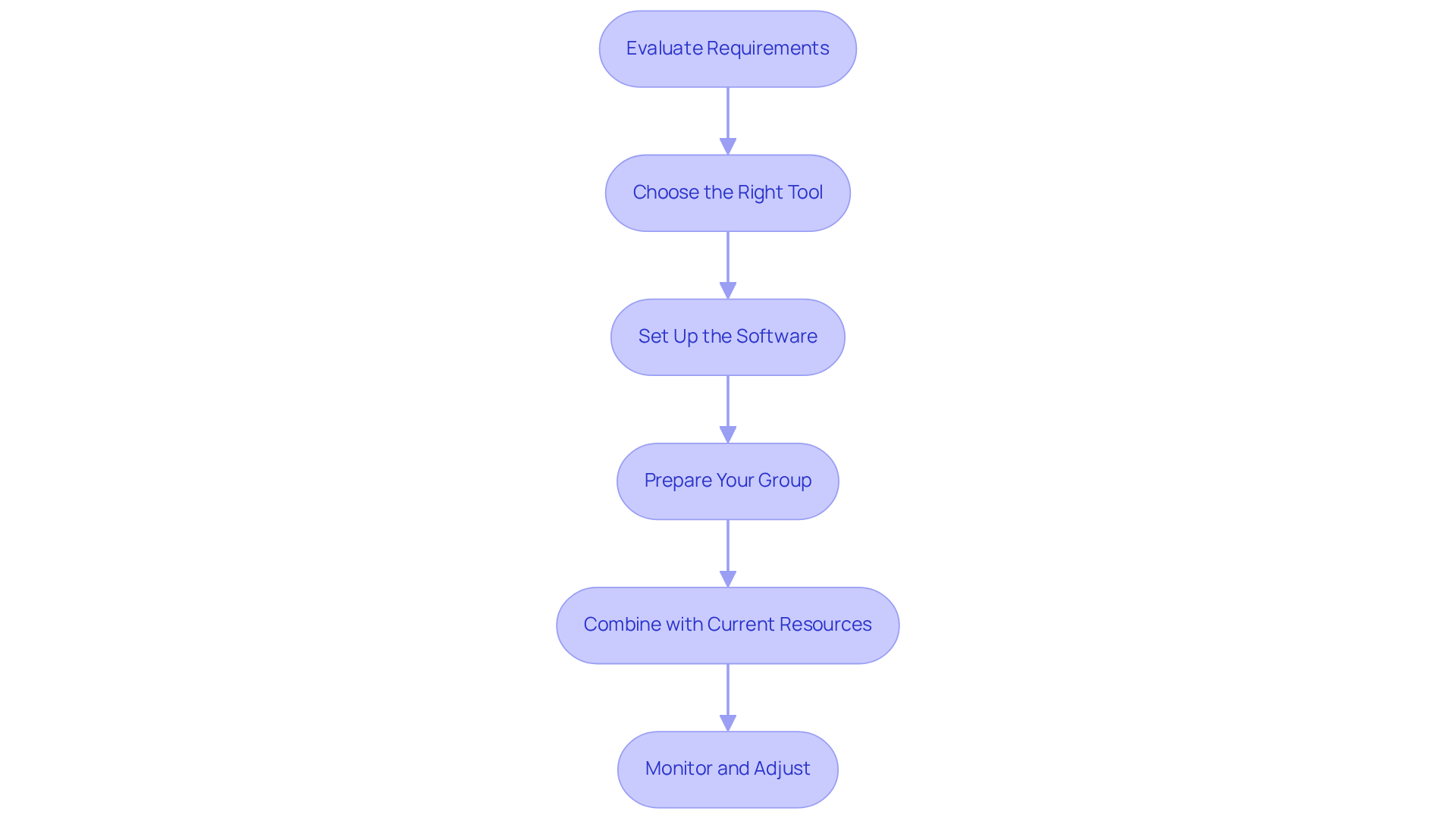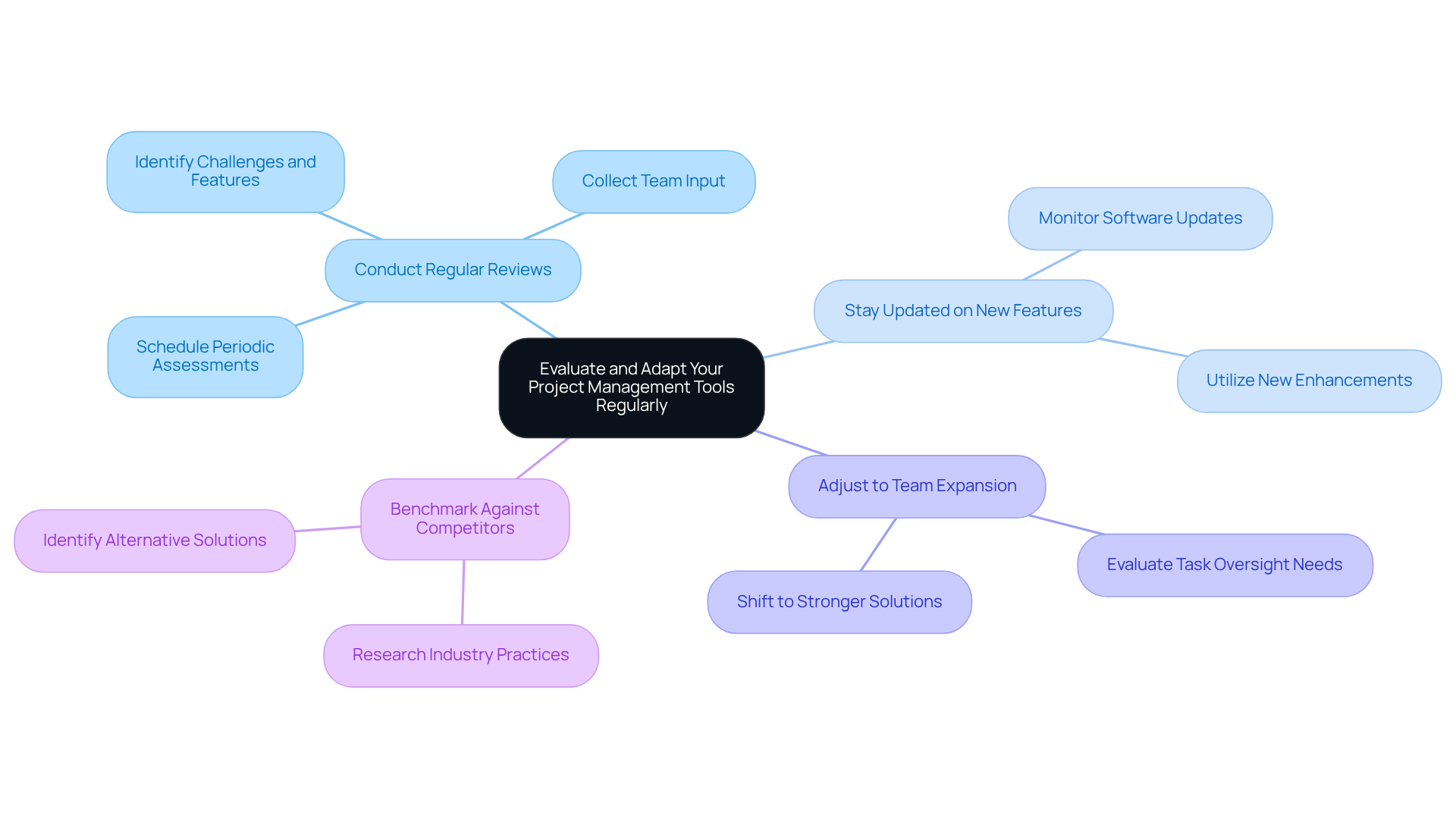Overview
The article identifies four essential project management software tools that are vital for startup success. These tools play a crucial role in enhancing organization, collaboration, and productivity. By detailing key features such as:
- Automated task creation
- Integration capabilities
- Customizable dashboards
- Robust reporting
the article addresses the unique challenges startups face in managing projects efficiently. This comprehensive overview not only highlights the significance of these tools but also provides actionable insights for startup founders looking to streamline their operations.
Introduction
In the landscape of startups, project management software has emerged as an essential resource, guiding founders through the intricate challenges of growth and collaboration. These tools not only facilitate task organization and improve team communication but also significantly diminish inefficiencies that can hinder progress. As startups face the dual pressures of limited resources and the necessity for swift adaptation, the pivotal question surfaces: how can they effectively harness the right project management tools to unlock their full potential and secure lasting success? This article delves into vital software solutions designed to empower startups in a competitive arena, while also examining the crucial features and best practices for successful implementation.
Understand the Role of Project Management Software in Startups
Project management software tools are essential for startups, acting as a backbone that empowers teams to organize tasks, track progress, and collaborate effectively. In environments where resources are often constrained, project management software tools provide a crucial framework to reduce chaos. For example, Casy automates task creation from chat discussions, allowing teams to concentrate on core activities rather than being bogged down by administrative tasks. This automation not only conserves valuable time but also reduces the risk of miscommunication—an essential factor in the fast-paced startup ecosystem. Teams that leverage software with integrated communication capabilities report a 52% improvement in collaboration, underscoring the effectiveness of these tools.
By seamlessly connecting with communication platforms such as Slack and Telegram, organizational software ensures that critical information is collected and addressed promptly, fostering a culture of accountability and transparency within the team. As startups increasingly recognize the importance of effective task management, the adoption of project management software tools is expected to rise, with the task management software market projected to grow at a CAGR of 18.48%. This trend significantly enhances productivity and operational efficiency, making project management software tools a crucial investment for startups.

Identify Key Features Essential for Startup Success
When selecting project management software tools, startups must prioritize features that enhance collaboration and task organization. Essential features include:
-
Automated Task Creation: Tools like Casy automatically generate tasks from conversations, minimizing manual input and ensuring that no critical tasks are overlooked. This is particularly crucial, as 80% of organizations report spending at least half their time on rework, highlighting the urgent need for efficiency in task management.
-
Integration Capabilities: The ability to connect with existing resources (e.g., Slack, Google Drive) is vital for seamless workflows. With 91% of groups utilizing virtual tools, effective integration can significantly enhance productivity by streamlining communication and document sharing.
-
Customizable Dashboards: Startups benefit from visual displays of progress, allowing for swift evaluations of team performance and project status. This feature supports the demand for real-time analytics, as 47% of organizations prioritize improving employee productivity, making it essential for startups to maintain clear visibility into their projects.
-
Collaboration Tools: Features that facilitate real-time communication and document sharing are indispensable for remote teams. Given that 36% of organizations are transitioning to smaller, more agile groups, efficient collaboration resources are critical for sustaining productivity and ensuring alignment among all members.
-
Reporting and Analytics: Startups should leverage tools that provide insights into team performance and timeline management, enabling data-driven decision-making. With only 37% of organizations satisfied with their initiative maturity, robust reporting features can help identify areas for improvement and inform strategic planning.
By focusing on these attributes, startups can ensure they select project management software tools that not only meet their current needs but also adapt to their growth. However, it is essential to be mindful of common pitfalls, such as overcomplicating the tool selection process or neglecting to gather input from colleagues, which can lead to misalignment with actual needs.

Implement Project Management Software: Step-by-Step Guide
Utilizing software for overseeing tasks can significantly enhance operational efficiency for startups. Here’s a structured guide to ensure a successful implementation:
-
Evaluate your requirements by recognizing the specific obstacles your team faces and the goals you intend to achieve with project management software tools. This foundational step is crucial, as 42% of companies fail to acknowledge the necessity of project oversight, resulting in higher project failure rates.
-
Choose the Right Tool: Select a tool that aligns with your identified needs. Look for essential features such as task organization, collaboration capabilities, and integration options. Notably, only 22% of organizations currently use management software, indicating a substantial opportunity for startups to gain a competitive edge.
-
Set Up the Software: Configure the software to fit your team’s workflows. This includes creating boards for the initiative, organizing tasks, and setting user permissions. A well-organized framework can reduce the 12% of resources wasted due to ineffective practices.
-
Prepare Your Group: Conduct comprehensive training sessions to familiarize team members with the new tool. Emphasize key features and best practices to maximize usage. Importantly, 83% of high-performing organizations provide ongoing project management training, which is vital for sustaining productivity.
-
Combine with Current Resources: Ensure seamless integration with tools your team already uses, such as communication platforms and file storage services. This integration is essential for enhancing collaboration and minimizing disruption during the transition.
-
Monitor and Adjust: After implementation, regularly solicit feedback from your team to identify areas for improvement. Adjust the software’s configuration as needed to enhance its effectiveness. Continuous monitoring can help mitigate common challenges faced by startups, such as miscommunication and task overload.
By following these steps, startups can effectively implement project management software tools, leading to improved productivity and collaboration among teams. Furthermore, applications like Casy can automate task creation and updates, further streamlining the workflow process.

Evaluate and Adapt Your Project Management Tools Regularly
To sustain peak productivity, startups must frequently assess their project management software tools. Here are essential best practices for this process:
- Conduct Regular Reviews: Schedule periodic assessments of the software’s performance and its alignment with team needs. Collect input from group members to pinpoint challenges or overlooked features, ensuring that the resource effectively aids daily operations.
- Stay Updated on New Features: Project coordination tools frequently roll out updates and new features. Staying informed about these changes enables groups to utilize enhancements that can simplify workflows and boost efficiency.
- Adjust to Team Expansion: As your startup grows, task oversight needs will change. Be ready to adjust your instruments or shift to stronger solutions that can handle greater complexity and team size, ensuring that your approach to overseeing tasks scales with your business.
- Benchmark Against Competitors: Monitor the resources utilized by similar startups in your industry. Understanding their choices can provide insights into whether alternative solutions might better serve your needs and enhance your operational effectiveness.
By committing to regular evaluation and adaptation, startups can ensure their project management software tools remain effective and relevant, ultimately supporting sustained growth and success.

Conclusion
Project management software tools are indispensable for startups striving for success in a competitive landscape. By streamlining task management, enhancing collaboration, and fostering accountability, these tools serve as a vital resource that propels startups toward their goals. The integration of communication platforms and automated features not only saves time but also minimizes the risk of miscommunication—an essential factor in the fast-paced environment of startups.
Key features essential for effective project management include:
- Automated task creation
- Integration capabilities
- Customizable dashboards
- Collaboration tools
- Robust reporting
Each of these elements significantly contributes to improved productivity and operational efficiency, allowing startups to adapt to their evolving needs. Moreover, implementing project management software involves a structured approach that emphasizes evaluating requirements, selecting the right tools, and continuously monitoring performance to ensure alignment with team goals.
The significance of project management software in startups cannot be overstated. It transcends being merely a tool; it is a foundational element that supports growth and innovation. By committing to regular evaluations and adaptations of these tools, startups can maintain their competitive edge and navigate the challenges of scaling effectively. Embracing these practices ensures that project management remains a cornerstone of success, enabling startups to thrive in an ever-changing business environment.
Frequently Asked Questions
What is the role of project management software in startups?
Project management software tools are essential for startups as they help teams organize tasks, track progress, and collaborate effectively, providing a framework to reduce chaos in resource-constrained environments.
How does project management software improve team efficiency?
It automates task creation from chat discussions, allowing teams to focus on core activities and reducing the time spent on administrative tasks, which conserves valuable time and minimizes the risk of miscommunication.
What impact does integrated communication have on collaboration?
Teams that use software with integrated communication capabilities report a 52% improvement in collaboration, highlighting the effectiveness of these tools in enhancing teamwork.
How do project management tools connect with communication platforms?
Organizational software can seamlessly connect with communication platforms such as Slack and Telegram, ensuring that critical information is collected and addressed promptly.
What is the expected growth of the task management software market?
The task management software market is projected to grow at a CAGR of 18.48%, indicating an increasing recognition of the importance of effective task management in startups.
Why are project management software tools considered a crucial investment for startups?
They significantly enhance productivity and operational efficiency, making them a vital investment for startups aiming to improve their organizational processes.




